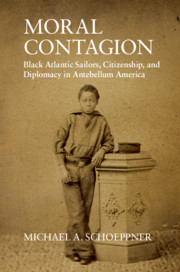Book contents
- Moral Contagion
- Studies in Legal History
- Moral Contagion
- Copyright page
- Dedication
- Contents
- Tables
- Acknowledgments
- Abbreviations
- Introduction
- 1 The Atlantic’s Dangerous Undercurrents
- 2 Containing a Moral Contagion, 1822–1829
- 3 The Contagion Spreads, 1829–1833
- 4 Confronting a Pandemic, 1834–1842
- 5 “Foreign” Emissaries and Rights Discourse, 1842–1847
- 6 Sacrificing Black Citizenship, 1848–1859
- 7 Black Sailors, their Communities, and the Fight for Citizenship
- Epilogue
- Appendix
- Bibliography
- Index
Epilogue
Published online by Cambridge University Press: 11 January 2019
- Moral Contagion
- Studies in Legal History
- Moral Contagion
- Copyright page
- Dedication
- Contents
- Tables
- Acknowledgments
- Abbreviations
- Introduction
- 1 The Atlantic’s Dangerous Undercurrents
- 2 Containing a Moral Contagion, 1822–1829
- 3 The Contagion Spreads, 1829–1833
- 4 Confronting a Pandemic, 1834–1842
- 5 “Foreign” Emissaries and Rights Discourse, 1842–1847
- 6 Sacrificing Black Citizenship, 1848–1859
- 7 Black Sailors, their Communities, and the Fight for Citizenship
- Epilogue
- Appendix
- Bibliography
- Index
Summary
- Type
- Chapter
- Information
- Moral ContagionBlack Atlantic Sailors, Citizenship, and Diplomacy in Antebellum America, pp. 217 - 220Publisher: Cambridge University PressPrint publication year: 2019



